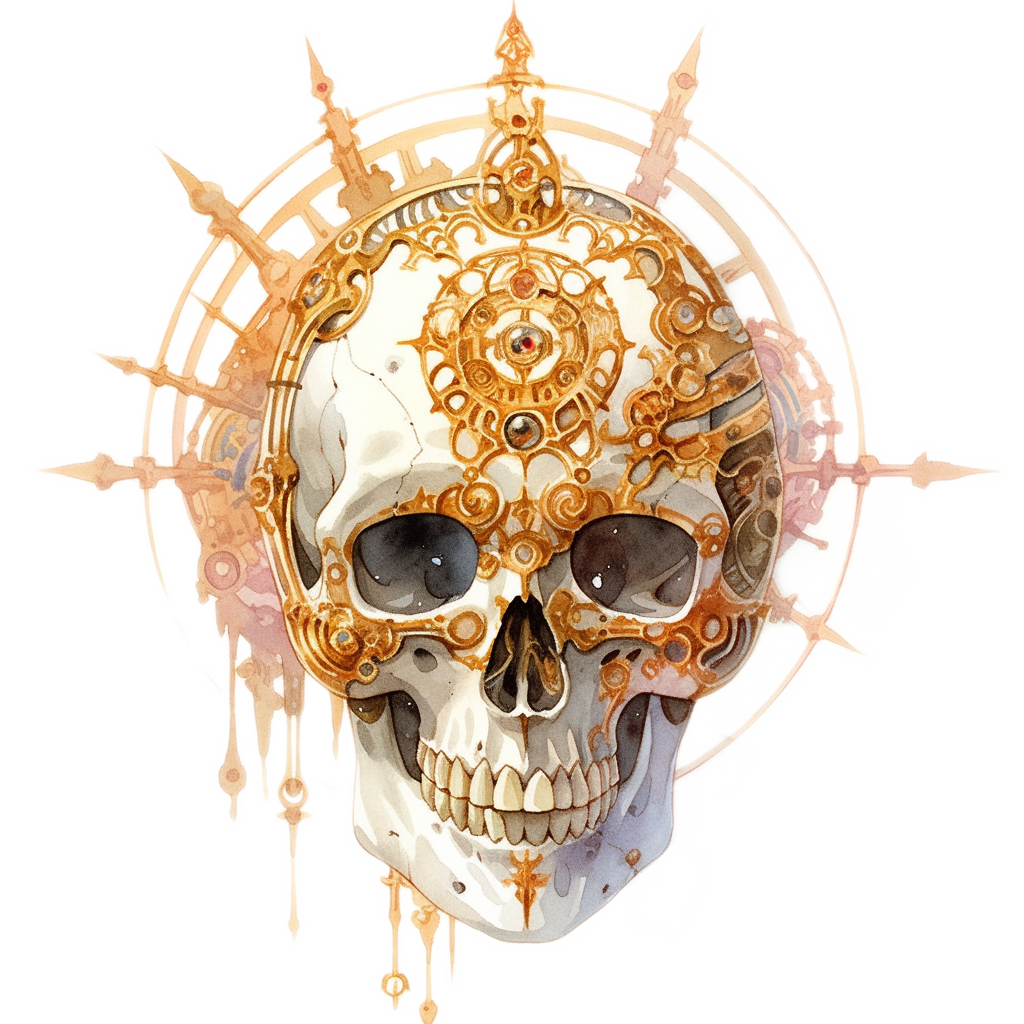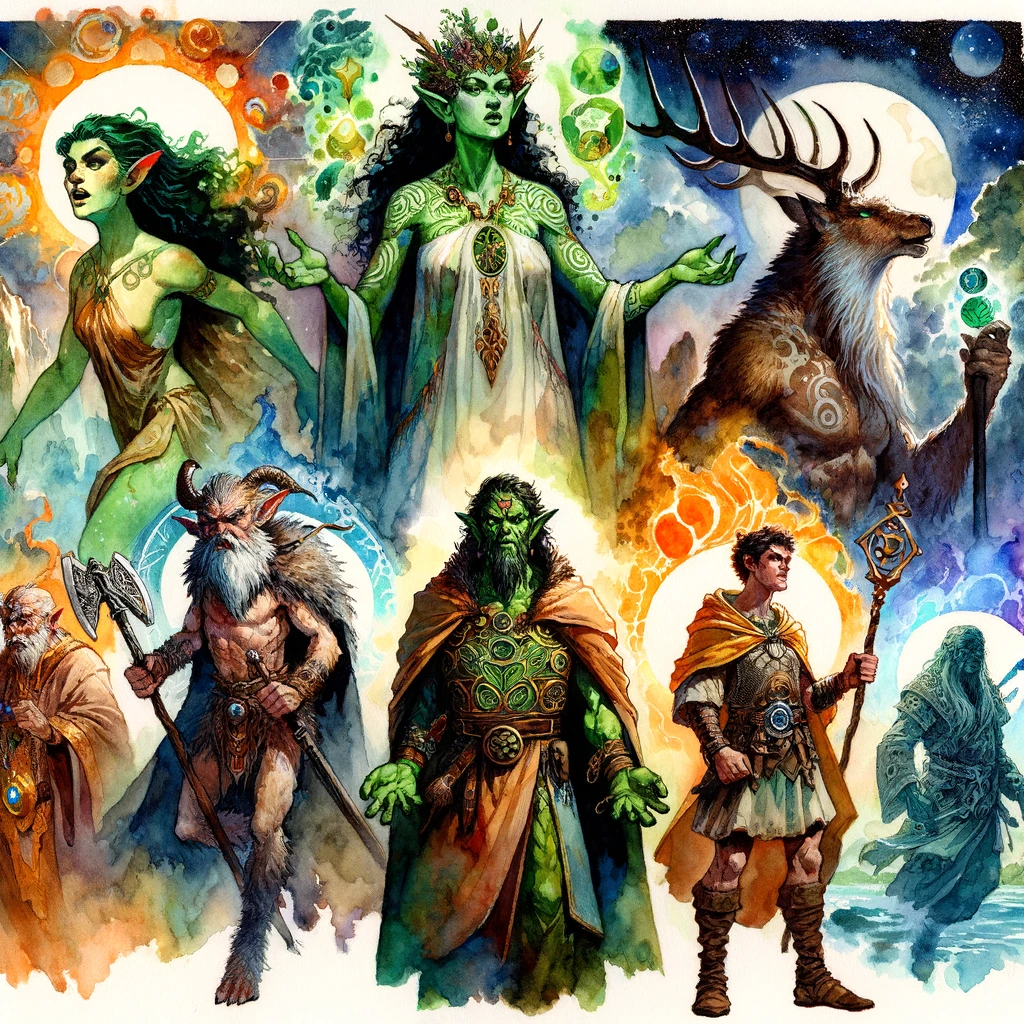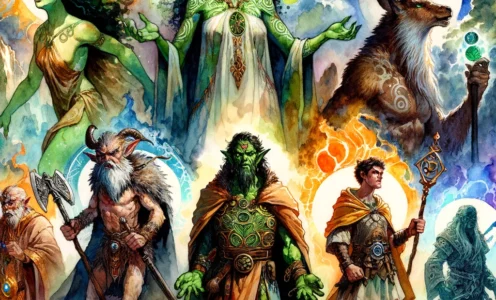The Athar Guide to the Wandering Powers
When traipsing around the Outlands a body’s bound to cross paths with all sorts of powerful and strange creatures—but potentially also the downright divine. We ain’t talking about your garden-variety archons or fiends here, berk. We’re jawing about the real big shots now, the Wandering Gods; those powers who ain’t tied themselves down to any single realm on the Great Ring. While most powers wrap themselves in their realms like protective cocoons, presumably so they can avoid berks when they want to, the Wandering Powers do the opposite. These unique bloods drift through the planes tangling their paths with cutters in ways you can’t even begin to fathom.
Now for some reason, these bloods seem to congregate on the Outlands, which has far more Wandering Powers than most of the other planes combined. Now this may seem an odd choice given the ability of the Spire to neutralise magic the closer you get to it, even the abilities of the gods themselves. But perhaps that’s the point. The Wandering Powers are mould-breakers already; being of immense might who refuse to settle down and Behave How Gods are Supposed To. Instead, they throw caution to the winds, making themselves vulnerable by not surrounding themselves with the safe embrace of a realm, and instead living a little, amongst us hoi polloi.
While most powers are holed-up in their realms or just busy being all nebulous and omnipresent—and are therefore nigh-on impossible to meet—the Wandering Powers seem to enjoy the company of, or perhaps the challenge of, the mortal cutters they bump into. Perhaps they enjoy testing them, or tricking them, helping them, or just watching them like a child might watch a colony of busy ants. But since there’s more chance of encountering a bored or curious power on the Outlands, I thought I should lann you some chant on what they might be up to, and how to—or how not to—interact with them.
Athar graybeards—who study this sort of thing for their own obvious motives—have found patterns in the behaviour of many of these Wandering Powers. And frankly, these tips can also apply to some of the powers who do maintain realms but like to meddle with mortal affairs more than most. Here then is a survey of the kinds of powers that wander, why, and how to keep yourself out of the dead-book if you encounter them.

The Aloof Watchers
Some of these wandering powers like to keep to themselves, observing the weave of the planes like a basher watching a puppet show from the shadows. Interacting with ’em is like trying to chat up a golem. They’re not there for the banter, see? They might be contemplating the great cosmic mysteries or just enjoying the scenery. For the chosen cutters, these distant deities could be sources of cryptic wisdom or unknowable quests. Imagine a god who speaks only in riddles, or one that appears at or foreshadows pivotal moments but refuses to interfere directly in events. For example:
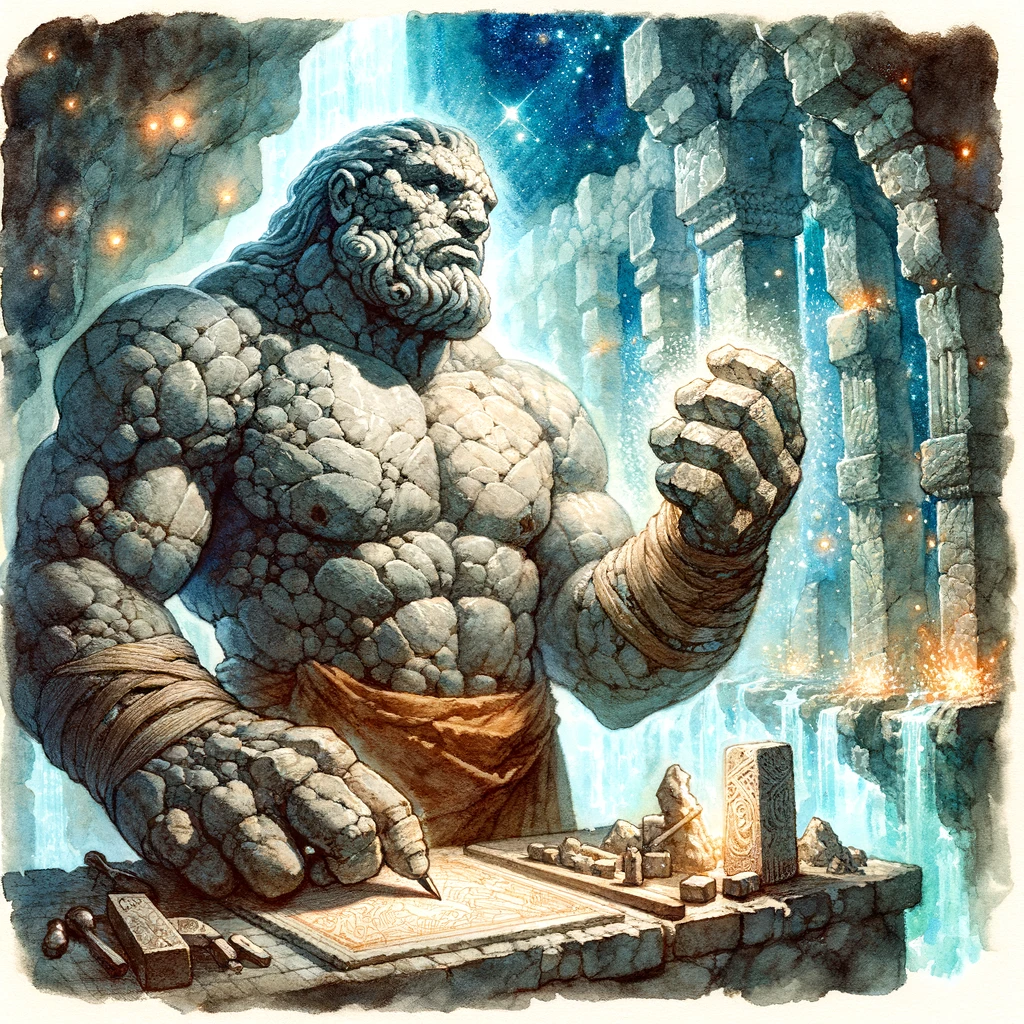
Skoraeus Stonebones of the Ordning (Giant Pantheon): The King of Rock is the god of stone giants and giant arts. He is known for his isolationist tendencies, preferring to travel in solitude and just contemplate the multiverse. And so, Old Stonebones wanders the planes endlessly rather than settling down in a realm of his own. Chant goes he’s particularly drawn to underground locations, mountains and the Spire.
For adventurous souls wandering the Outlands, encountering Skoraeus Stonebones could be an insightful experience. While he generally keeps to himself and talk to rocks, an adventurer who shares his respect for the earth and its hidden wonders might just catch his eye. Skoraeus isn’t one for direct intervention; he prefers subtlety, communicating through natural omens such as the colouration of rocks, the rumble of planequakes or the patterns of stalactites. Skoraeus’s presence is like the clatter of falling rocks in the dark, a subtle but powerful force guiding those who would listen thoughtfully. Stone giant legends talk of his avatars, usually elemental creatures like galeb duhr, which might intervene to protect his followers from danger, lead them to new homes, or nudge them towards hidden treasures. If you’re traversing the Outlands, particularly its underground tunnels, keep your eyes and mind open, and you might realise you’re under the watchful gaze of the Living Rock.
DM’s Note: Aloof Watchers can serve various narrative purposes. They might represent enigmatic forces of the universe, their motivations beyond the understanding of mortals. Encounters with such deities can leave characters with more questions than answers, pushing them to explore the deeper mysteries of the cosmos. Their aloof nature also allows for plenty of intriguing storytelling opportunities. Perhaps a deity’s rare intervention or cryptic message sets off a chain of events that the player characters must navigate. Or maybe the very act of trying to attract the attention of such a god becomes a central plot point.

The Divine Testers
Now, here’s where things get interesting. Some of these wandering powers are all about seeking out mortals in order to test their mettle. They might set up situations to judge character, bravery, or intelligence. Think of a power who disguises themselves as a beggar or a helpless elderly crone, intending to test the kindness of adventurers. Or perhaps a deity that presents moral dilemmas, like saving a town at the cost of a single innocent soul. There might be no correct outcome—which is the point of the divine test—to test not with might, but by how a cutter approaches a problem and copes with the weight their your own decisions, making them question not just their actions but their own moral compass altogether.
Lugh of the Tuatha de Danann: Lugh, the Celtic power of the arts, travel, and commerce, is a real mover and shaker in the pantheon, much like his brother Dian Cécht. This cutter is also on a never-ending quest for excellence, roaming the planes in search of new knowledge and experiences. It’s said that if he ever finds something he can’t do, he might finally settle down. But that day seems as far off as the Lady of Pain showing a smile. Despite being a jack-of-all-trades, Lugh’s not the top dog in everything. He dabbles in arts, commerce, and travel, and he’s a dab hand at the cross-trade, but he’s always looking for more. A bit of a charmer, he’s known for wooing the ladies wherever he goes. He might challenge an adventuring party to teach him something, best him in a contest, or impress him.
Fharlanghn of the Oerdian Pantheon: A power of horizons, distance, travel, and roads, Fharlanghn is known for guiding his followers—or just travellers to whom he takes a shine—on journeys that test their moral fibre, often placing them in situations where they must make difficult ethical choices.
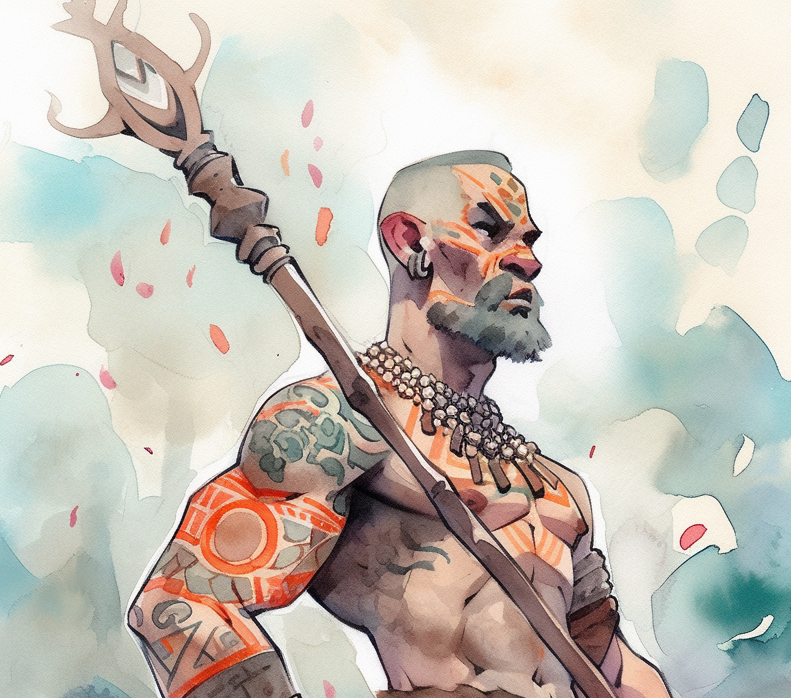
Cú Chulainn of the Tuatha de Danann: Berk, this cutter is a dangerous one to cross. He’s the Celtic power of personal challenges, heroism and battle, and sees himself as the first line of defence of Tir na Og. The one thing you should not do it challenge him in one-on-one combat—chant goes he’s defeated entire armies single handedly, despite being ‘only’ a demipower. Tangling with a power in a fight is a terrible idea even on a good day, but old Cú is a tougher blood than most. The best way to get on his good side is to undertake some task defending Tir na Og that he’s too busy to attend to himself; he’ll delegate a challenging task to a worthy-looking cutter.
DM’s Note: Divine testers present moral challenges, dilemmas, or tests, offering a rich vein of story potential. These powers can challenge PCs to reflect on their actions and decisions, pushing them to consider the broader implications of their choices. Encounters with such powers can take many forms—a seemingly innocuous decision that has far-reaching consequences—like when Jason of Argonaut fame stopped to help an old lady across a river, who was really Hera in disguise, losing a sandal in the process and fulfilling an ancient prophecy—or a dilemma where any choice has a cost attached to it that challenges the core of a character’s beliefs.

The Trickster Meddlers
And then, there’s the bane of many a planar traveller—the trickster gods. These are the ones that get their jollies by stirring the pot. They might lead characters on wild goose chases, turn their worlds topsy-turvy, or even pit them against each other for a laugh. Their interference isn’t always malicious; sometimes it’s just a god’s way of breaking the monotony. But it’s always a game, and mortals are the pawns. Imagine a power who swaps the souls of party members for a lark, or one that sends characters on a quest that turns out to be a wild snipe hunt.
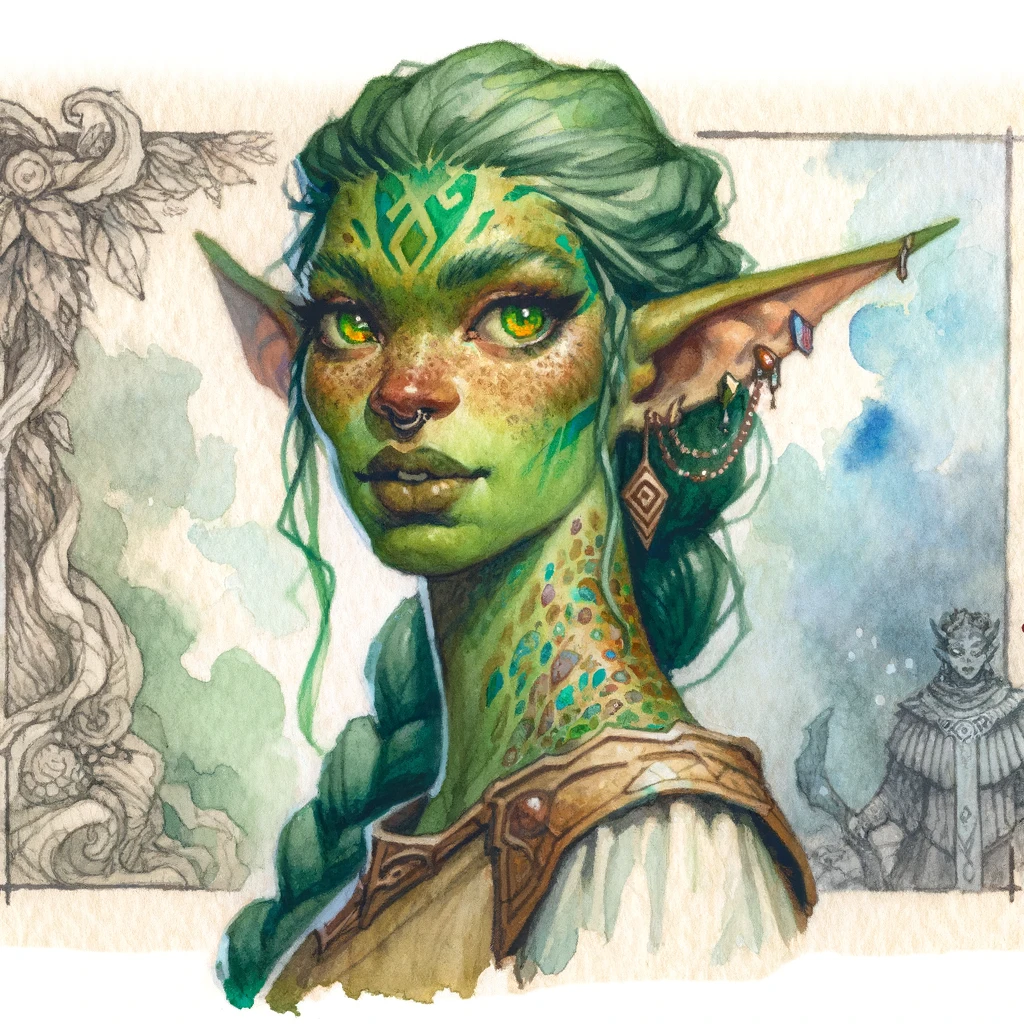
Diancastra of the Ordning (Giant Pantheon): Every blood on the Outlands knows a half-dozen stories about the legendary Diancastra, the giantish power of playing tricks and having fun doing it, like the time she nicked a black pearl necklace right from under Blibdoolpoolp’s nose, or when she bamboozled a servitor of Surtr in a chase of illusions while her owl pinched his spellbooks. Now, if you catch Diancastra’s eye, you’re in for a wild ride. She’s got a thing for adventurers, especially those with a spark of wit, a handsome jawline or a tale worth hearing. She might join you for a bit of fun, share a secret or two, maybe even lend a hand with a spell if you’re lucky. But don’t go thinking you can outsmart her—she’s always three steps ahead.
Zagyg of the Oerdian Pantheon: These days Zagyg wanders the Great Ring, and seems to particularly like the Outlands. Now, if you’re a body out in the ’Lands and Zagyg spots you and takes a shine to you, buckle up! He’s likely to whisk you away on a jaunt filled with riddles, illusions, and the odd curse that’ll have you scratching your head for days. But there’s always a method to his madness. He might just lead you to some forgotten trove of magical knowledge or help you pull off a prank that’ll have the whole plane talking. His unpredictable nature means you never know where or how he’ll show up. Could be as a fellow traveler on the road, a mysterious benefactor in a tavern, or even a rival wizard with a penchant for practical jokes. You may not even realise it was him until long after he’s gone. He’s a reminder that in the grand scheme of the multiverse, a bit of laughter and a dash of unpredictability can go a long way. Keep your wits about you, and who knows, you might just find yourself the star of Zagyg’s next grand jest.
Brandobaris of Yondalla’s Children (the Halfling Pantheon): Don’t underestimate this little blood; he might appear to be a young and innocent halfling, but he’s got a wit sharper than any blade and a wicked sense of misadventure to match. Brandobaris is all about tempting cutters, especially halflings, into having adventures. He’s a true wanderer, a lover of the journey more than the destination. He often appears as an ordinary halfling rogue, enlisting his followers in grand adventures where the risks are high, but the rewards higher. He’s also found wandering the Outer Planes, particularly the Outlands with its rich pickings of divine realms and easy getaway routes.
Bes of the Egyptian Pantheon: A power of luck and music, Bes loves to gamble, for jink or for fate. He can be capricious, but if a cutter can hold their nerve and lean in to the whirlwind of chaos that surrounds this power, you can earn his favour. And the favour of a power of protection is never a bad thing to have up your sleeve.
Then there’s the lot like Loki and Olidammara who do have realms but just like stirring up trouble. Ah, the Trickster Meddlers, a true pain in the backside for any planewalker. These sly dogs might spin a yarn that leads you down a rabbit hole of riddles and misdirection. What starts as a simple errand ends up a wild romp through twisted realities, teaching you to think twice before taking things at face value.
DM’s Note: Incorporating trickster gods into your campaign can add a layer of unpredictability and fun. These deities can turn the narrative on its head, presenting challenges that are as whimsical as they are perplexing. Their interventions might seem random, but they often have deeper meanings or consequences. Encounters with trickster gods can range from light-hearted pranks that challenge the players to think creatively to complex schemes that have significant impact on a narrative arc.

The Secret-Knowers
Consider the wise ones, like Dalt or Dian Cécht. The Secret-Knowers, they’re called. Meet one in the Outlands, and you might just unlock a secret of the multiverse… for a price. A whisper in a tavern, a cryptic rune in an ancient ruin – these are the keys they offer, opening doors to knowledge untold but beware, for not all truths are meant for mortal minds.
Some powers are like living libraries of forbidden or lost knowledge. Encounters with them might give player characters access to ancient wisdom, hidden truths, or prophecies. But there’s always a price for such knowledge, be it a task to perform, a secret to keep, or even the price of a piece of the seeker’s own soul. Dealing with these gods is like dancing on the edge of a knife; one wrong step and you’re in the dead-book.
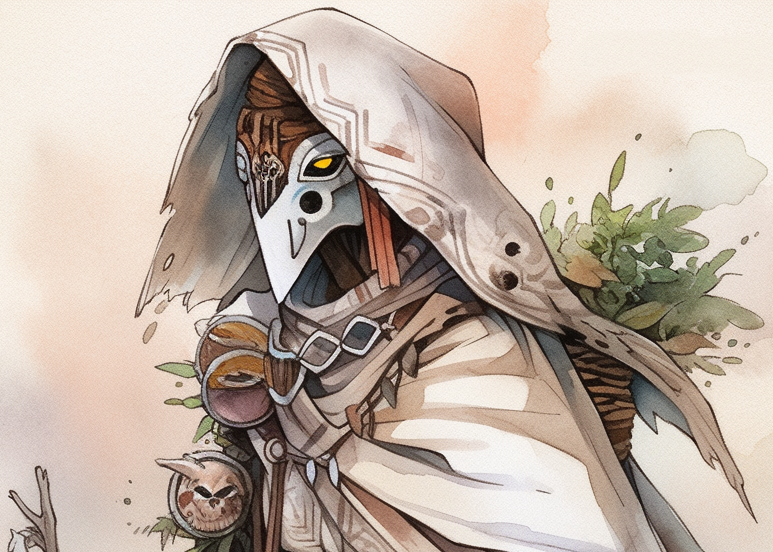
Dian Cécht of the Tuatha de Danaan: Old Dian Cécht’s a walking, talking infirmary, fixing up everyone he comes across–friend or foe alike. Now, here’s the dark of it—Dian Cécht’s got an ego as big as the Outlands when it comes to his healing prowess. He’s a nomad, roaming about looking for sods to help and drawing his juice from the act of healing itself. He usually wears a mask, so you might think he’s just a shaman, but many’s the blood who’s been sent on a hunt for a rare herb by Dian Cécht for the promise of bringing a mate back to life or removing a curse. Whether the power actually needed the herb to be able to perform the magic is debatable; partly it’s a taste of faith and mettle.
Dalt of the Oerdian Pantheon: Now here’s a blood you might want to seek out rather than hope finds you. But if you’re outside of Sigil and you need a portal somewhere really obscure, or to learn the dark of a key, or even a complex but mundane lock, then you could do a lot worse than seek out Dalt, the power of doors and keys. It’s a cert that he’ll want something in return, and that something probably has to do with Sigil—like all powers, Dalt is barred from the Cage and it drives him barmier than most. He might be seeing a portal key that can only be found in the Cage, or want a message passed to a proxy there, or an item smuggled in for him for some reason. Chant goes he is still looking for a way to cheat the Lady and enter the Cage, so be careful with that last kind of request, a berk never knows when they’re being played for a rube.
DM’s Note: Secret-Knower powers can serve as mysterious, enigmatic figures, if used in moderation. Their interactions with PCs will often revolve around quests for forbidden knowledge, deciphering ancient prophecies, or uncovering lost history. The information or secrets provided by these powers can be a double-edged sword: immensely valuable but potentially dangerous or burdensome. These powers often present moral dilemmas: How much is a character willing to sacrifice for knowledge? What will they do with the secrets they uncover? The paths to gaining this knowledge can be as simple as completing a quest, or as complex as solving intricate puzzles or making significant sacrifices. The incorporation of a Secret-Knower can drive the story forward through quests for lost artifacts or forgotten lore, and their revelations can alter the course of events or the understanding of the multiverse. Interactions with these deities are not just about acquiring information, but also about dealing with the responsibilities and consequences that come with such knowledge.

The Reality Shifters
These gods have the power to alter reality itself, at least in a localised way. Encounters with them can lead to players findin’ themselves in altered landscapes, different planes, or even different points in time. The challenge for the players is to navigate these altered realities, understand the nature of the change, and find a way to either adapt or set things right. In some cases, an encounter with one of these deities can lead to a mortal undergoin’ a profound transformation—be it physical, spiritual, or even existential. This could range from being granted extraordinary abilities (permanently or temporarily), undergoing a physical metamorphosis, or having one’s very essence altered. Such transformations can be blessings or curses, and they often come with new insights, powers, and responsibilities.
Hapi of the Egyptian Pantheon: Hapi is the power of flooding, silt and abundance, and they’re usually found wandering the lands around the River Ma’at. This cutter is most likely to be encountered when a berk’s lost in the desert, and their last waterskin is empty. Hapi isn’t one to let sods die needlessly on their watch, but neither are they generous without conditions. Thirsty berks might find a miraculous oasis that definitely wasn’t there just now—the waters fresh and sweet. But after they’ve quenched their thirst, a talking snake or ibis or carp will inform the cutters of the price they’ve agreed to pay. It’ll be some kind of service that benefits Hapi, or the local community or environment; perhaps ridding the lands of a troublesome baatezu patrol or dangerous river monster.
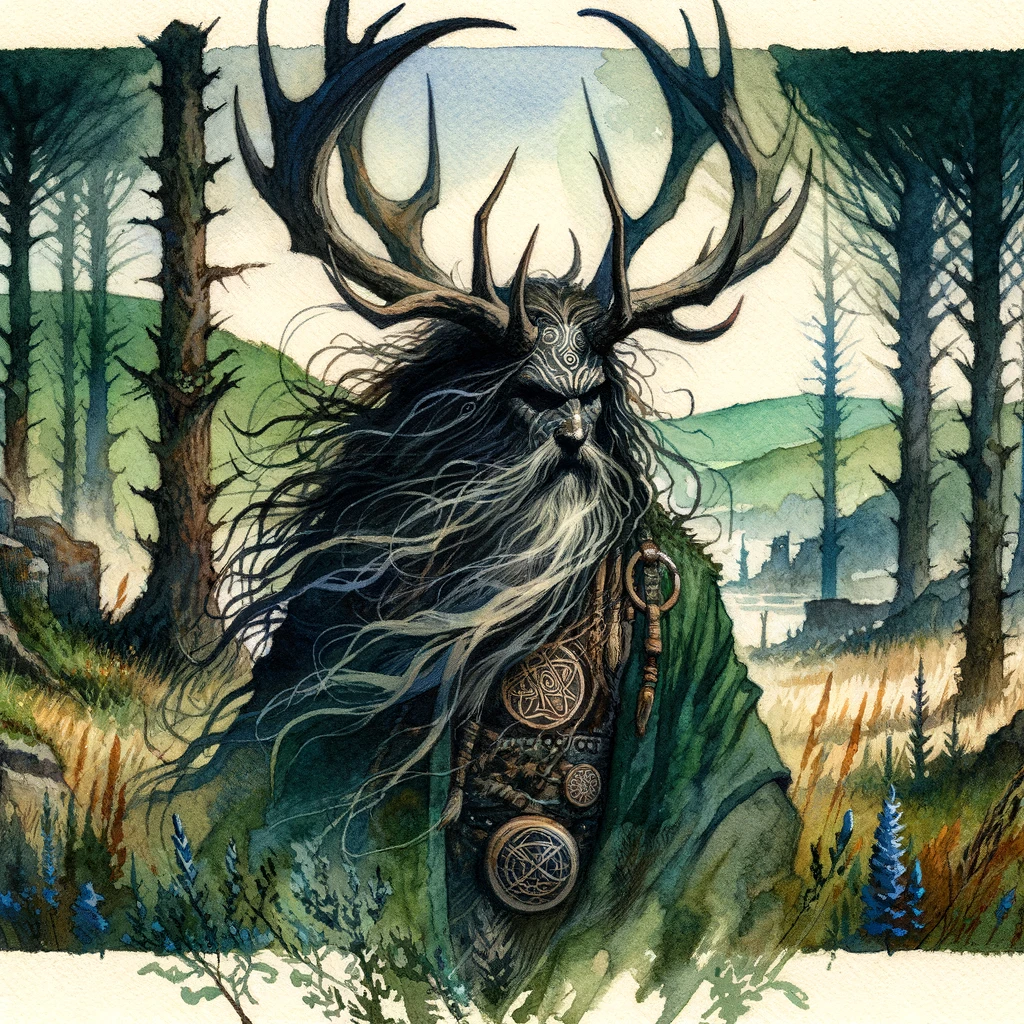
Cernunnos of the Celtic pantheon: Encountering Cernunnos, or at least the Wild Hunt that runs with him, can be a thrill or a danger, or more likely both. When you’re involved with these cutters, reality itself warps around you, to a place that’s neither Outlands nor Fey Realm, to a unique land where the Hunt is all and all is the Hunt.
Ceridwen of the Celtic Pantheon: The night hag of inspiration, Ceridwen roams the mystic lands of Tir na Og, cloaked in magical disguises. She’s no ordinary demipower, mind you. She’s a meddler, and loves nothing more than moving amongst mortals and petitioners incognito, stirring up creativity in the brain-boxes of the bashers she encounters—but only if they put in some effort themselves. She particularly loves bards, poets, illusionists and transmuters, and is something of a weird muse to them. Weird because she’s a frightful looker when she’s doing her hag routine, which is a shame as it tends to scare off berks who could otherwise have learned all sorts of darks from her. One tip for the wise though; don’t cross Ceridwen. There are plenty of tales of woe about those who do, and end up transformed into frogs, inanimate objects, or worse.
DM’s Note: The Reality Shifters can turn your world upside down in a blink. One minute you’re in a tavern, the next you’re in a dreamscape, questioning everything, including your own sanity. Meeting one might mean a boon or a curse, changing you in ways you never expected, bending the rules of what’s real and what ain’t. Great power, sure, but at what cost? It’s a gamble, like everything in the planes. These powers can significantly impact player characters, offering narrative depth and character development opportunities.
Encounters with these deities can lead to quests for transformation, be it seeking a new form, greater powers, or even a different state of being. These transformations can serve as major plot points or character arcs. They might come with great benefits but also with costs or challenges. For instance, a character might gain immense strength or wisdom but lose part of their humanity or face new vulnerabilities. Alternatively, a transformation might be a curse that the character seeks to reverse, leading them on a journey of self-discovery and challenge. They might change gender, bodies, race, or character class—and allows for exploration of themes like switching identities, or just a way to make fundamental changes to characters without breaking plot immersion completely.
Incorporating Reality Shifter gods into your campaign adds a layer of cosmic unpredictability and wonder. Such encounters remind players that they are traversing a universe where the impossible can become possible at the whim of a deity.

The Divine Quest-Givers
Sometimes powers, especially those wanderin’ types, might take a more hands-on approach, directing mortals on quests that serve their divine purposes. Maybe a deity needs a relic retrieved from a forsaken plane, or a rival god’s scheme thwarted. These quests often come with divine rewards, but also with their fair share of peril. It’s not just about fetching and carrying; it’s about being a pawn in a game played by beings as old as time itself. Quests can vary greatly in nature—from retrieving sacred artifacts and slaying monstrous entities, to solving ancient mysteries or restoring balance to a region of the planes by planting a flower in the Abyss. These tasks often push characters to their limits, forcing them to grow and adapt in unexpected ways. These quests often come with significant rewards but also with risks and moral dilemmas.
DM’s Note: Divine quests are a staple in mythological and fantasy stories, often setting mortals on epic quests that shape their destinies, testing the mettle, wisdom, and character of those who undertake them. Moreover, divine quests can intertwine with larger themes and conflicts within your campaign, connecting the actions of player characters to the broader machinations of the powers and the fate of the planes. Each quest is an opportunity to explore the complex relationships between mortals and deities, as well as the consequences of divine intervention in the multiverse.

Imperfect Disguises
Now powers are smart, sneaky and have virtually no limits to the abilities they can wield. If they don’t want to be discovered, it’s a cert that they shouldn’t be. Some wandering powers however seem to enjoy the thrill of being caught out by mortals, and get careless. Or perhaps they literally couldn’t care less whether a mortal know their true nature. In any case, here are some clues that might help a cutter work out whether that mysterious old lady is Hera in disguise… or just a grumpy old woman.
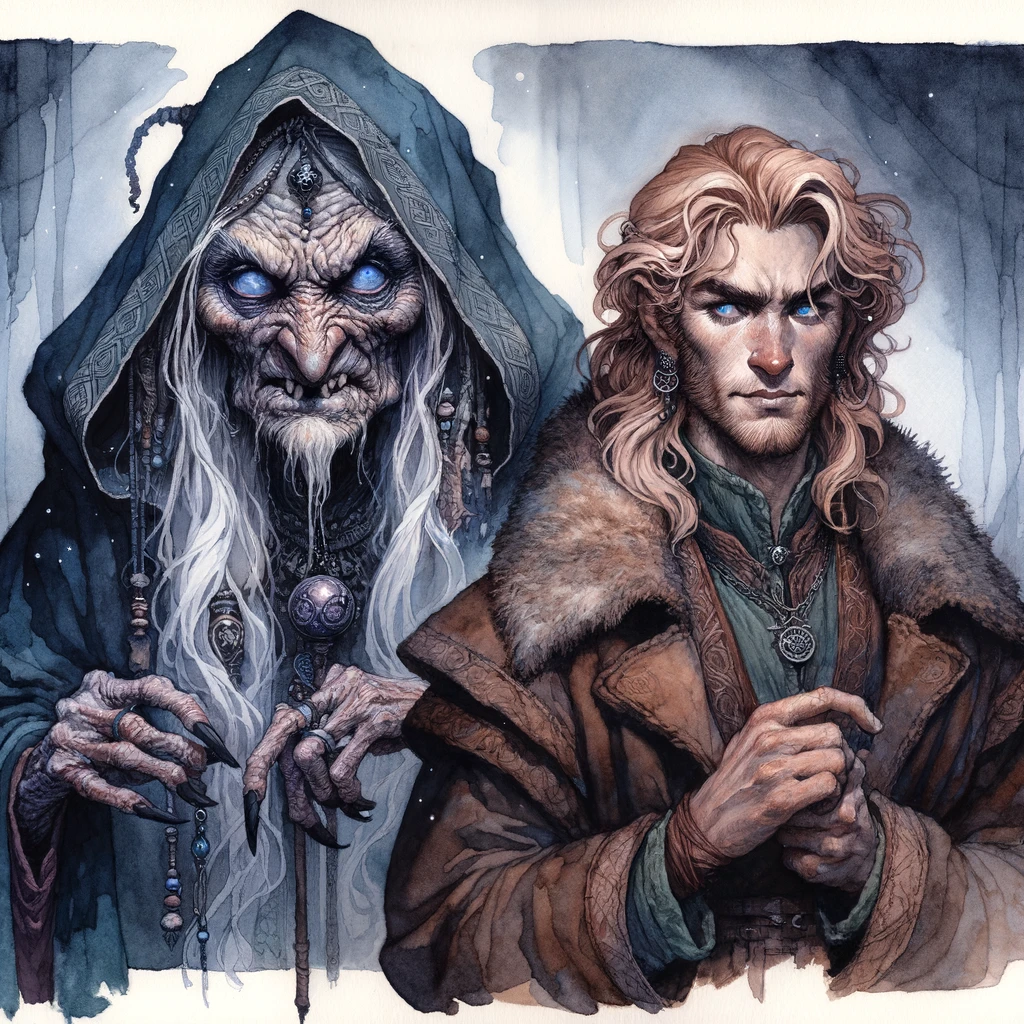
- Subtle Clues and Ambiguities: You might be able to pick up on subtle hints as to the cutter’s true nature, but you can bet they’ll be hard to detect. Perhaps the cutter knows things they shouldn’t, or they’ve got an uncanny ability to be in just the right place at the right time.
- Inconsistent Behaviour: Does the cutter act consistently? A cutter hiding their divinity might flip between acting in ways that are both god-like and surprisingly mundane. One moment, they’re spouting wisdom like a sage, the next they’re baffled by the simplest of mortal concerns. If you spot this kind of behaviour, chances are you’re either dealing with a deity in disguise, or just really quirky berk.
- Divine Aura (or Lack Thereof): Sometimes, if you look just right, you might catch a glimpse of something otherworldly about the cutter—a fleeting aura of power, eyes that momentarily flash with a celestial light, a voice that echoes a little bit too much. But then, at other times when they’re watching themselves, they might appear utterly normal, with no hint of divine presence. You can bet mundane tricks like detect magic ain’t gonna show you a thing.
- Contradictory Rumours: You might hear different stories about the cutter from multiple sources. Some chant might whisper that they’re a deity in disguise, others might laugh it off as superstitious nonsense. The conflicting information will keep you on your toes and speculating for sure.
- Divine Intervention (or is it?): Have events ever occurred around you that could be interpreted as divine interventions, but then also have mundane—if improbably coincidental—explanations as well? A stroke of incredible luck, a timely piece of information—could be the work of a god, or maybe it’s just chance.
- Unique Talents or Abilities: Does the cutter seem to have a unique skill or ability, something that hints at more than meets the eye? But again, it’s likely to be ambiguous. Maybe they’re just a really skilled individual, or maybe there’s something more to it.
- Playing with Expectations: Don’t build up your expectations based on chant you might have heard about the power. If you’re expecting a deity to act a certain way, it’s a cert they’ll know this and act to defy these expectations. It’ll throw you for a loop and keep you guessing.
- Mystery and Escape: Has the cutter ever vanished or escaped from situations in ways that are hard to explain? Perhaps they use divine power, or perhaps they’re just really good at not getting caught?
DM’s Note: By employing these tactics, you can weave a tale of intrigue and mystery, where the PCs are never quite sure if they’re dealing with a mere mortal or a power playing at being mundane. Done right, it can add a layer of depth to your campaign, making the players hang on every word and action of the NPC, always wondering, second guessing. That’s the kind of story that sticks with a body, long after the dice have stopped rolling.

Words of Caution
DM’s Note: If you decide to user Wandering Powers in your game, be aware that you’re treading in tricky territory when dabbling with the gods in a Planescape campaign. While mixing in deities can spice up the stew, there’s a few pitfalls a savvy DM ought to watch out for:
- Reducing the Mystery: Gods, by their nature, are beings of great mystery and power. Overusing them can make the divine feel too commonplace, stripping away the awe and wonder that should accompany a brush with a power. If every problem has a divine hand in it, or every solution comes from on high, the game can become predictable. Players might start thinking, “Oh, another god will pop in any moment now,” and that can leech the excitement right out of an adventure. Keep ’em mysterious, like a rare spice that’s best savoured in small doses.
- Overshadowing Player Agency: When powers start poking their noses into every turn of the corkscrew, players might feel like they’re just leaves in the wind, blown about by divine whims. It’s crucial to keep the spotlight on the players, letting them be the ones making the big decisions and driving the story, rather than just reacting to the machinations of the powers. Once you’ve introduced a power, let them take a back seat and make sure the players are the ones driving the story from there.
- Narrative Complexity: Dealing with gods can add layers of complexity to the narrative, which ain’t bad on its own, but it can be a right barmy knot to untangle. A DM needs to be careful not to get so wrapped up in the divine drama that the story becomes too convoluted or inaccessible for the players.
- Contradicting Player Beliefs: Planescape’s a place where belief shapes reality. If a DM constantly introduces gods that directly contradict or undermine the beliefs and goals of the PCs, it can lead to a disconnect and diminish the players’ investment in the game. Take special note of this when introducing powers from real-world mythologies.
- Upsetting Game Balance: Deities, being the top dogs of the cosmic pecking order, have abilities that can easily upset the balance of a game. A DM tossing in a god to solve every hard spot can make challenges feel trivial. Likewise, an overly wrathful deity can bring down the thunder in ways that the party just can’t handle, leading to frustration. Speaking of which…
- Let’s Kill Tiamat! This is exactly the sort of thing you want to avoid; unless your PCs are 20th level or more, it simply shouldn’t be possible to even contemplate taking on a power, let alone winning. If your players are the sort who are likely to try and fight a deity then forget everything you just read above—and avoid having them meet a power in the first place. Because if they don’t get squished by a power they try and fight, you’re doing it wrong.
For a canny DM, the key is to use divine interventions sparingly and thoughtfully. Make an encounter with a deity (or more likely their avatar or an aspect of the power) something really special, something that shakes the planes. Balance it right, and you’ll have a story that’s the talk of Sigil.
Source: Jon Winter-Holt, mimir.net
